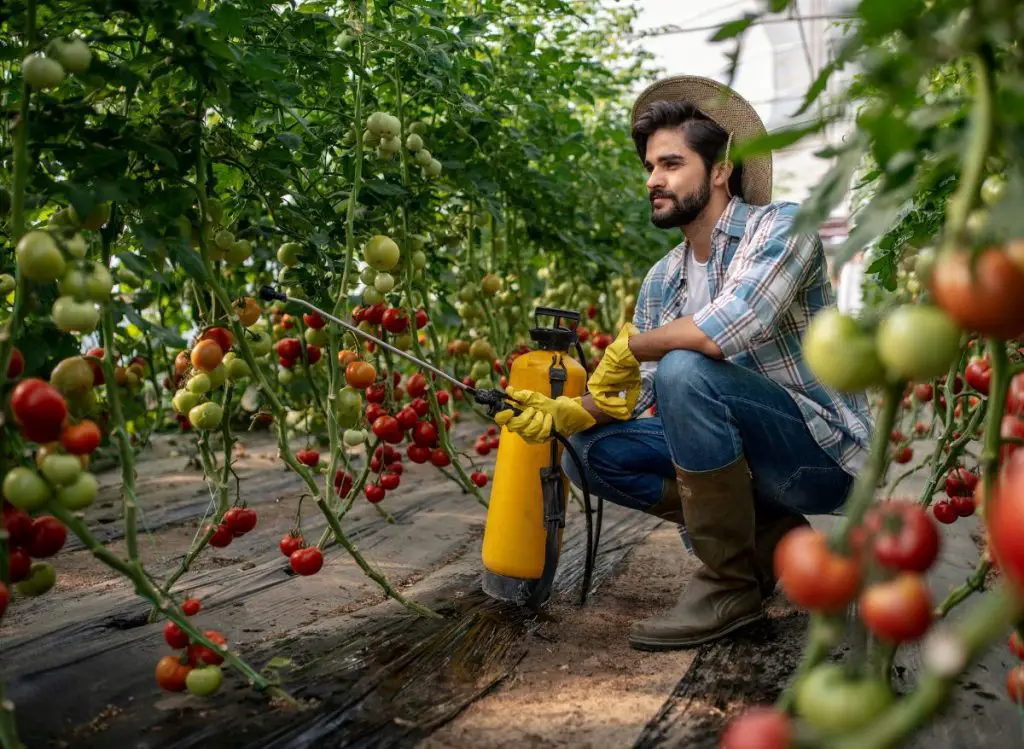
Bugs are always on the lookout for a meal, and the tender growth of vegetable plants is one of their favorite meals. Whether the pests crawl, fly, jump, or run, they need to eat to survive, and your garden is a smorgasbord of tasty food and beverages for them.
Gardens of all types are subject to bug damage, and even indoor plants are not immune to a pest infestation. Be prepared to fight back at the first sign of pests in your garden so they won’t be able to destroy your crops.
You can help your vegetable plants remain pest-free with these homemade bug sprays for vegetable plants that actually work. None of these sprays contain chemicals, and all are safe for use on vegetable plants.
The bug sprays are safe for flowers too. Pests like aphids do not discriminate between vegetables and flowers, so if one type of plant is infested, other plants within your landscape are infested as well. Treat all plants with one of these homemade bug sprays to prevent re-infestation.
Spray plants late in the evening when pollinators are not active. Remember, if the homemade bug spray will kill harmful pests, it will also kill the beneficial ones.
Waiting until after the sun sets will also protect the vegetable plants from foliar damage that could be caused by the combination of direct sunlight and bug spray.
If you are looking for the best ways to prepare your soil for planting vegetables, I encourage you to read this article.
1- Hot Pepper Spray
This homemade bug spray for vegetable plants will kill and repel aphids and several other sap-sucking pests. It will also repel animals that can destroy gardens, like cats, dogs, rabbits, squirrels, and deer. The scent of the hot pepper is usually enough to keep house pets away from the plants, but be mindful of all your house pets when using any DIY pest sprays.
How To Make Hot Pepper Spray For Your Garden:
- Put 2 cups of any variety of hot pepper and 2 cups of water in a blender and blend until the mixture is smooth.
- Pour liquid into a small saucepan and simmer on low heat for 5 minutes.
- Allow mixture to cool, then pour it through a strainer and into a spray bottle.
- Spray the homemade hot pepper spray on the plant and the soil/mulch around the plant.
- Spray on the plant stem and underside of leaves where many garden pests like to hide.
- Spray a generous amount around the perimeter of your garden if you have problems with small animals entering your garden.
- Re-apply once a week.
Watch the video below on how to make hot pepper spray for your garden.
2- Dish Soap and Oil
Dish soap repels and kills bugs; oil helps the dish soap remain on the vegetable plant and smothers the bugs, eggs, and larvae. I suggest you use an organic dish soap that contains no toxins, so it will be environmentally friendly.
How To Make Dish Soap and Oil For Your Garden:
- Mix 1 tablespoon of dish soap into 1 cup of vegetable oil.
- Keep this mixture in a small lidded container.
- When needed, mix 2 tablespoons of the mixture into warm water and pour into a spray bottle.
- Spray on vegetable plants when evidence of bug problems appears. It’s very effective on aphids, thrips, mites, and scales.
You might also enjoy reading: top 6 best battery-powered backpack sprayers.
3- Tomato Leaf Bug Spray
The leaves of tomato plants have natural defense chemicals called solanine and tomatine. Both contain fungicidal and insecticidal properties that help the plants naturally repel pests and diseases.
You can extract the natural solanine and tomatine chemicals and use them as an effective homemade bug spray on your vegetable plants.
Tips On Making Tomato Leaf Bug Spray:
- Harvest 2 cups of fresh tomato plant leave and soak them in a quart of water for 12 hours.
- Strain the liquid and pour it into a spray bottle. It’s safe to spray on garden plants as needed.
- This DIY bug spray will kill aphids and many types of chewing insects while attracting beneficial insects to your garden.
4- Garlic Spray
The scent of garlic repels both large and small garden pests. This homemade bug spray does not kill the bugs but repels many pests, so they never come into your garden.
How To Make Garlic Spray For Your Garden:
- Peel 2 cloves of garlic and place them in the blender along with 1 cup of water. Puree until smooth, then strain the liquid.
- Pour into a lidded quart jar and add 1/2 cup of vegetable oil and 1 tablespoon of liquid dish soap. Shake to combine.
- Fill the quart jar the rest of the way with water. When the garlic spray is needed, pour 1 cup of the mixture into a spray bottle and finish filling it up with water.
- Spray on vegetable plants and around the garden perimeter.
The video below describes how to make garlic spray as a natural pesticide.
5- Soap Spray
Any type of soap (organic is best) with work for this homemade soap spray that effectively kills bugs. The soap dissolves the exterior shell or coating of the bug, so it dehydrates and dies. This is an easy recipe to make up ahead of time, so you will always have it on hand and can quickly spray your vegetable plants at the first sign of trouble.
Tips On Making Soap Spray:
- Mix 2 tablespoons of liquid dish soap in a gallon of water.
- Pour into a spray bottle and saturate garden plants as needed.
6- Baking Soda and Vegetable Oil
This homemade bug killer works by dehydrating the pests. It’s very effective for killing slugs, snails, ants, and roaches.
How To Make Baking Soda and Vegetable Oil For Your Garden:
- Mix 2 tablespoons of baking soda,1 tablespoon of vegetable oil, and 1 teaspoon of liquid dish soap into a quart of water.
- Pour into a spray bottle and spray on and around vegetable plants as needed.
Watch the video below for tips on how to make baking soda spray for your garden.
Help Make Your Vegetable Plants Pest-Proof
- Strong plants don’t attract as many pests as weak ones do. Strong plants can also withstand a pest attack better, so the best way to pest-proof plants is to keep them healthy and strong.
- Keep vegetable plants well-fed and growing strong with compost. Amend the soil with compost before planting your garden; use compost as mulch and/or side dress garden plants every 4 weeks with a fresh application of compost.
- If you use synthetic fertilizer, do not over-fertilize the garden plants. Too much fertilizer will cause the plants to develop an abundance of fresh foliage that will attract pests.
- Use companion plants to repel pests. Marigolds are the best all-around pest-repelling companion plant for the entire garden. Garlic, mint, and sage also repel a wide variety of garden pests.
- Use DIY plant collars around tender seedlings to prevent creeping and crawling pests from attacking plants at the soil level. Cardboard tubes from toilet paper and paper toweling make great bio-degradable plant collars.
- Select seeds and seedlings that are pest-resistant when possible. These varieties have natural characteristics that pests just don’t like, so they typically don’t attack them.
- Time garden planting to avoid the peak season of certain pests. For example, squash borers lay their eggs in mid-summer, so you want to get squash planted in early spring and be nearing the end of their productive season by mid-summer.
- Plant flowers and vegetables that will attract beneficial pests, like the Ladybug. Cosmos, geraniums, dill, chives, cilantro, and fennel are some of the Ladybug’s favorite food plants.
- Become a plant inspector and inspect garden plants daily. Look for signs of pests, like egg sacks, sticky secretions, and holes in leaves. Handpick the larger pests and destroy them and use one of the above-mentioned homemade bug sprays for vegetable plants to save your plants.
Wrapping Up
These are the 6 best homemade bug sprays for vegetable plants to try right now. More importantly, they are easier to make and will help you prevent bugs from destroying your garden.
These homemade bug sprays for vegetable plants are worth trying as they provide an organic solution for organic gardening.
What to read next:

